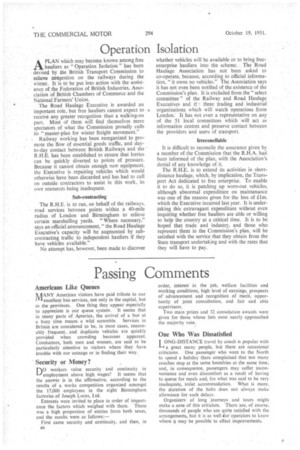Operation Isolation
Page 40

If you've noticed an error in this article please click here to report it so we can fix it.
APLAN which may become known among free hauliers as "Operation Isolation" has bepn devised by the British Transport Commission to relieve congestion on the railways during the winter. It is to be put into action with the assistance of the Federation of British Industries, Association of British Chambers of Commerce and the N.ational Farmers' Union.
The Road Haulage Executive is awarded an important role, but free hauliers cannot expect to receive any greater recognition than a walking-on part. Most of them will find themselves mere spectators of what the Commission proudly calls its "master-plan for winter freight movement."
Railway working has been reorganized to promote the flow of essential goods traffic, and dayto-day contact between British Railways and the R.H.E. has been established to ensure that lorries can be quickly diverted to points of pressure. Because it cannot obtain enough new equipment, the Executive is repairing vehicles which would otherwise have been discarded and has had to call on outside contractors to assist in this work, its own resources -being inadequate.
Sub-contracting The R.H.E. is to run, on behalf of the railways, road services between points within a 40-mile radius of London and Birmingham to relieve certain marshalling yards. "Where necessary," says an official announcement, "the Road Haulage Executive's capacity will be augmented by subcontracting traffic to independent hauliers if they have vehicles available."
No attempt has, however, been made to discover whether vehicles will be available or to bring freeenterprise hauliers into the scheme. The Road Haulage Association has not been asked to co-operate, because, according to official information, "it owns no vehicles." The Association says it has not even been notified of the existence of the Commission's plan. It is excluded from the "select committee" of the Railway and Road Haulage Executives and three trading and industrial • organizations which will watch operations from London: It has not even a representative on any of the 51 local committees which will act as information centres and preserve contact between the providers and users of transport.
Irreconcilable It is difficult to reconcile the assurance given by a member of the Commission that the R.H.A. had been informed of the plan, with the Association's denial of any knowledge of it.
The R.H.E. is to extend its activities in shortdistance haulage, which, by implication, the Transport Act dedicated to free enterprise. To enable it to do so, it is patching up worn-out vehicles, although abnormal expenditure on maintenance was one of the reasons given for the loss of Ern. which the Executive incurred last year. It is under.taking this extravagant expenditure without even inquiring whether free hauliers are able or willing to help the country at a critical time. It is to be hoped that trade and industry, and those who represent them in the Commission's plan, will be satisfied with the service that they obtain from the State transport undertaking and with the rates that they will have to pay.




































































































